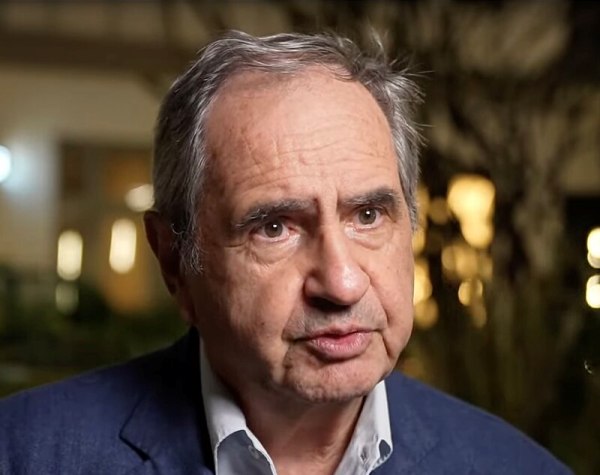
Pierre Rosanvallon is a political scientist and professor of political history at the Collège de France since 2001.
Photo: Librairie Mollat
French historian Pierre Rosanvallon, a world reference in studies on democracy and political representation, will be the first to occupy the Darcy Ribeiro Chair: Sovereignty, Education and Politics, an initiative of the Institute of Advanced Transdisciplinary Studies (IEAT) at UFMG. As the chair holder, Rosanvallon will give two public lectures at UFMG on November 18th and 25th, discussing the impasses of contemporary democracies and the rise of populist dynamics in the 21st century.
On Tuesday, November 18th, Rosanvallon will give the lecture “The Crisis of Democracy,” starting at 10:00 AM in the auditorium of the UFMG Rectorate. The event is open to the public and a certificate of participation will be issued upon registration through the Even3 platform. The lecture will be in French, with simultaneous translation into Portuguese.
Pierre Rosanvallon will begin his talk with a diagnosis of the critical moment facing democratic regimes: although they hold regular elections, they have failed to fulfill essential functions such as pluralistic representation and institutional legitimacy. Rosanvallon will analyze the strengthening of the Executive Branch, the social fragmentation into singular identities, the emptying of the community dimension of politics, and the reduction of democracy to the mere act of voting.
The historian will also discuss the current gap between formal democracy and political practice, reflecting on the causes of the widespread feeling of “non-representation” and on how practices of bad governance—perceived in the lack of transparency, authoritarian management, and ineffective political actions—amplify citizens’ distrust.
Based on his works on the subject, Rosanvallon outlines a path for renewing this scenario through a more complex democracy, with a plurality of forms of expression (independent institutions, regulatory mechanisms, continuous participation), which would be guided by three essential qualities: legibility, responsibility, and reactivity. The objective, according to him, is to overcome the traditional model of “authorization democracy” and build more direct and continuous forms of popular participation towards an “appropriation democracy,” in which citizens participate more directly and consciously.
The following week, on Tuesday the 25th, the conference “The Century of Populism” will be held at 5 PM in auditorium 1 of the Faculty of Economic Sciences (FACE) at UFMG. The event is open and free. To receive a certificate of participation, registration is required through the Even3 platform. The conference will be in French, with translation available.
At the conference, Rosanvallon will discuss the political and institutional effects of contemporary populism, which result in the deterioration of representation and a crisis of democratic legitimacy. According to him, by appealing to the simplified and idealized notion of a ‘people’, populist dynamics tend to erode traditional representative forms and restrict the space for debate and deliberation.
Based on his book Le Siècle du populisme: Histoire, théorie, critique (2020), not yet translated into Portuguese, Rosanvallon will demonstrate how populist rhetoric articulates rejection of elites, cult of personality, and plebiscitary democracy, highlighting its effects on institutions and representation.
Rosavallon will discuss the risks of using referendums as a substitute for representation and direct popular consultation (plebiscitaryism) as a pure expression of the popular will. For him, democracy is only strengthened when it incorporates complex, impartial, and participatory forms of representation. He thus proposes a democracy capable of revaluing the role of institutions and public consultation, recreating spaces for mediation between the multifaceted people and political decisions.
About the professor
Pierre Rosanvallon is Professor Emeritus at the Collège de France, where he held the Chair of Modern and Contemporary History from 2001 to 2018, and is currently Director of Studies at the École des Hautes Études en Sciences Sociales (EHESS). A graduate of the École des Hautes Études Commerciales de Paris (HEC Paris) and with doctorates in Management Sciences and History from the University of Paris-Dauphine and the EHESS, under the supervision of Claude Lefort, he is considered one of the most influential thinkers on contemporary democracy. His work examines the transformations of the State, the crisis of representation, and the challenges to democratic legitimacy in current societies.
Author of fundamental works such as La Contre-démocratie (2006), La Légitimité démocratique (2008), and Le Siècle du populisme (2020), Rosanvallon is recognized for formulating concepts that expand the notion of democracy beyond voting, incorporating citizen oversight, institutional impartiality, and political reflexivity. He has received honorary doctorates from several universities and is an officer of the Legion of Honor of France.
IEAT Darcy Ribeiro Chair
Created in 2024, the IEAT Darcy Ribeiro Chair: Sovereignty, Education and Politics aims to promote transdisciplinary dialogue around themes that reflect urgent issues for contemporary Brazil, guiding debates on national sovereignty, the strengthening of the educational system, and the consolidation of inclusive and just public policies.
The title honors Darcy Ribeiro for his decisive contribution to the fields of anthropology, education, and Brazilian culture, and for his visionary role in founding the University of Brasília, a symbol of a new paradigm of interdisciplinary knowledge and commitment to national development. The initiative has the institutional support of Minas Gerais congressman Patrus Ananias, through the allocation of resources via parliamentary amendment.